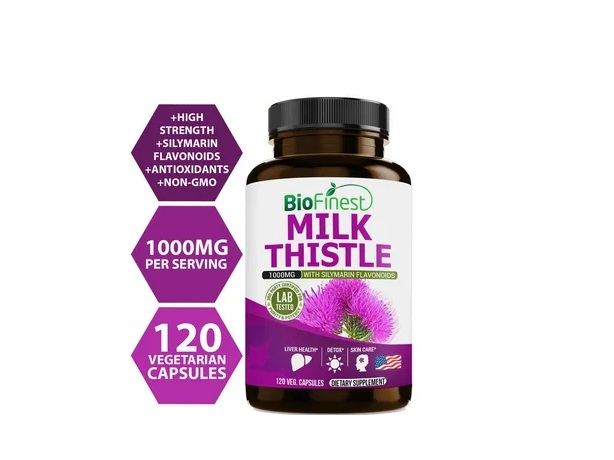In recent years, the popularity of natural remedies and supplements has surged, with individuals seeking alternatives to traditional medicine for various health concerns. One such supplement that has gained significant attention is milk thistle. Milk thistle, scientifically known as Silybum marianum, is a flowering herb native to the Mediterranean region but now found throughout the world. It has been used for centuries as a natural remedy for liver disorders, and its extract is commonly consumed in supplement form. In this comprehensive guide, we will delve into the benefits of milk thistle supplements, exploring its potential health effects and scientific evidence supporting its use.
Understanding Milk Thistle
Milk thistle is characterized by its distinctive purple flower and spiky leaves. However, it is the seeds of the milk thistle plant that contain the active ingredients believed to confer its health benefits. The primary active component of milk thistle is a group of flavonoids collectively known as silymarin. Silymarin is composed of several flavonolignans, including silybin, silydianin, and silychristin, which are thought to exert antioxidant and anti-inflammatory effects within the body.
Liver Support and Detoxification
One of the most well-known benefits of milk thistle supplements is their potential to support liver health. The liver plays a vital role in detoxification, metabolizing drugs, filtering toxins, and synthesizing proteins. However, exposure to environmental pollutants, alcohol, processed foods, and certain medications can place strain on the liver, leading to oxidative stress and inflammation. Silymarin, the active compound in milk thistle, is believed to protect liver cells from damage by acting as a potent antioxidant, scavenging free radicals and reducing inflammation. Additionally, silymarin may stimulate the regeneration of liver cells, aiding in the repair of damaged tissue.
Clinical Evidence
Numerous studies have investigated the effects of milk thistle supplements on liver health, particularly in individuals with liver diseases such as hepatitis, cirrhosis, and non-alcoholic fatty liver disease (NAFLD). While results have been mixed, some clinical trials have shown promising outcomes. For example, a systematic review published in the journal Phytotherapy Research analyzed 13 clinical trials involving over 600 participants with alcoholic and/or viral hepatitis. The review found that milk thistle supplementation was associated with improvements in liver function tests and histological outcomes compared to placebo or no treatment. However, further research is needed to fully understand the therapeutic potential of milk thistle in liver disease management.
Antioxidant Properties
In addition to its liver-protective effects, milk thistle supplements are valued for their potent antioxidant properties. Oxidative stress occurs when there is an imbalance between the production of free radicals and the body’s ability to neutralize them. Prolonged oxidative stress can damage cells and contribute to chronic diseases such as cardiovascular disease, cancer, and neurodegenerative disorders. Silymarin, the main bioactive component of milk thistle, has been shown to scavenge free radicals, inhibit lipid peroxidation, and enhance the activity of endogenous antioxidants such as glutathione. By reducing oxidative damage, milk thistle supplements may help mitigate the risk of various age-related diseases and promote overall health and longevity.
Cholesterol and Blood Sugar Regulation
Emerging research suggests that milk thistle supplements may exert beneficial effects on cholesterol levels and blood sugar regulation. High cholesterol levels are a major risk factor for cardiovascular disease, while fluctuations in blood sugar levels can lead to diabetes and metabolic syndrome. Animal studies have demonstrated that silymarin supplementation can reduce total cholesterol, LDL (“bad”) cholesterol, and triglyceride levels while increasing HDL (“good”) cholesterol levels. Furthermore, silymarin may improve insulin sensitivity and glucose metabolism, potentially lowering the risk of type 2 diabetes. Human studies are limited but have shown promising preliminary results, indicating the need for further investigation into milk thistle’s role in lipid and glucose regulation.
Anti-inflammatory Effects
Chronic inflammation is implicated in the pathogenesis of numerous diseases, including arthritis, asthma, inflammatory bowel disease, and cardiovascular disease. Milk thistle supplements may help combat inflammation due to their ability to inhibit pro-inflammatory signaling pathways and cytokine production. Silymarin has been shown to suppress the activation of nuclear factor-kappa B (NF-κB), a key regulator of inflammation, and downregulate the expression of inflammatory mediators such as interleukin-6 (IL-6) and tumor necrosis factor-alpha (TNF-α). By modulating the inflammatory response, milk thistle supplements may offer therapeutic benefits for individuals suffering from inflammatory conditions.
Support for Digestive Health
Beyond its hepatoprotective effects, milk thistle supplements may also promote digestive health. The liver and gastrointestinal tract are intricately connected, with the liver producing bile to aid in the digestion and absorption of fats and fat-soluble vitamins. Dysfunction of the liver can impair bile production and flow, leading to digestive discomfort and nutrient malabsorption. By supporting liver function and bile secretion, milk thistle supplements may improve digestion and alleviate symptoms such as bloating, gas, and indigestion. Furthermore, silymarin’s anti-inflammatory properties may help soothe gastrointestinal inflammation and promote the healing of intestinal mucosa in conditions like inflammatory bowel disease (IBD) and irritable bowel syndrome (IBS).
Dosage and Safety Considerations
While milk thistle supplements are generally considered safe for most individuals when taken at recommended doses, it is essential to exercise caution, particularly in certain populations. Pregnant and breastfeeding women, as well as individuals with known allergies to plants in the Asteraceae family, should avoid milk thistle supplementation unless under the guidance of a healthcare professional. Additionally, individuals taking medications metabolized by the liver should consult their healthcare provider before starting milk thistle supplements, as silymarin may interfere with drug metabolism and affect medication efficacy. Common side effects associated with milk thistle supplementation are rare but may include gastrointestinal upset, allergic reactions, and headaches. It is advisable to purchase milk thistle supplements from reputable manufacturers to ensure product quality and purity.
Conclusion
In conclusion, milk thistle supplements offer a range of potential health benefits, particularly in supporting liver function, combating oxidative stress, regulating cholesterol and blood sugar levels, reducing inflammation, and promoting digestive health. While further research is needed to fully elucidate the therapeutic effects of milk thistle, existing evidence suggests that it may serve as a valuable adjunctive therapy for various health conditions. As with any dietary supplement, it is essential to consult with a healthcare professional before incorporating milk thistle into your wellness regimen, especially if you have underlying medical conditions or are taking medications. By harnessing the power of nature’s remedies, such as milk thistle, individuals can take proactive steps towards optimizing their health and well-being.
- Expedition Series by Vessel: Unleashing Adventure with Style and Durability! - August 2, 2024
- Chill Out with Melo: A Taste Adventure with THC Seltzers - May 17, 2024
- Benefits of Gentian Supplements - April 1, 2024

